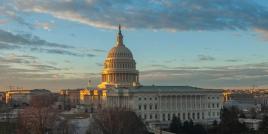House E&C Committee Draft of FDA User Fee Legislation Would Beef Up Agency’s Inspection Authority

A bipartisan draft of must-pass legislation reauthorizing the FDA’s collection of user fees for the next five years, released May 4 by the House Energy and Commerce (E&C) Committee, includes provisions that would significantly expand the agency’s authority to conduct inspections.
The proposed Food and Drug Amendments of 2022, H.R. 7667, would renew the FDA’s user fee programs for prescription and generic drugs, biosimilars and medical devices beyond Sept. 30.
The committee’s Health Subcommittee advanced the legislation May 11. The full committee was scheduled to take up the bill the following week.
The proposed legislation contains the following new statutory authorities and clarifications related to the agency’s inspection programs, which a committee release said would “strengthen supply chains through accountability in FDA’s inspections programs” and “provide FDA tools to ensure the agency can conduct thorough safety inspections efficiently”:
Scope of device inspections. The bill would specify that inspections of all medical device establishments, not just inspections of establishments dealing with restricted medical devices, could extend to anything at a facility that bears on whether a device is adulterated or misbranded, whether a device cannot be legally marketed, or whether the device otherwise violates the Federal Food, Drug, and Cosmetic Act (FD&C Act) (21 U.S.C. §374(a)(1)).
Records requests in advance of or in lieu of inspections. The legislation would authorize the FDA to request records in advance of or in lieu of inspections not only from drug establishments but also from medical device establishments (21 U.S.C. §374(a)(4)).
The agency would be required to provide not only a description of the records requested but also “a rationale for requesting such records or other information in advance or, or in lieu of, an inspection.”
Within one year of the bill’s enactment, the FDA would be required to issue draft guidance describing the circumstances in which the agency intends to issue such record requests, the process for responding to the requests electronically or in physical form, and the factors that the FDA would consider when evaluating whether the records are provided “within a reasonable timeframe, within reasonable limits, and in a reasonable manner,” taking into account resource and other limitations, including the resource limitations of small businesses. The final guidance would be due within a year of the end of the comment period for the draft guidance.
Bioresearch monitoring (BIMO) inspections. The bill would clarify the FDA’s authority to conduct BIMO inspections, as well as the information and the types of sites, facilities, studies and submissions subject to such inspections. The authority would apply to sites owned or operated by application or submission sponsors, institutional review boards, or any other person conducting clinical studies. The legislation would preserve limits on the disclosure of confidential commercial information or other proprietary or trade secret information (21 U.S.C. §374(a)).
In a clarification requested by the agency, the FDA’s authority to request records in advance of or in lieu of inspections would be made expressly applicable to BIMO inspections. The bill specifies that the clarification of the agency’s authority does not infer that the agency previously lacked such authority.
The FDA would be required to review its processes and practices applicable to foreign and domestic BIMO inspections, update the processes and practices as needed, and issue guidance on those processes and procedures. The draft guidance would be due within 18 months of the user fee legislation’s enactment, and the final version of the guidance would be due within one year after the close of the comment period.
Uses of evidence. The user fee legislation would clarify that limitations on the FDA’s use of certain evidence involving the movement of products in interstate commerce and obtained from carriers and receivers do not apply to information obtained under other statutory authorities, such as the sections of the FD&C Act authorizing inspections (21 U.S.C. §373).
Improving FDA inspections. The bill would allow the FDA to consider the compliance history of establishments in a particular country or region as a risk factor when the agency establishes schedules for risk-based inspections (21 U.S.C. §360(h)(4)).
The agency would be able to use any records or other information collected for the purposes of or in lieu of an inspection to satisfy requirements pertaining to a preapproval or risk-based surveillance inspection, as well as to resolve deficiencies found during such inspections, “if applicable and appropriate” (21 U.S.C. §374).
The legislation would expand the scope of inspections by foreign governments recognized by the FDA to include preapproval inspections (21 U.S.C. §384e).
Beginning within a year after the enactment of the user fee bill, the FDA would periodically assess “whether additional arrangements and agreements with a foreign government or an agency of a foreign government … are appropriate.” Beginning within four years after the legislation’s enactment, the agency must submit a report to the House Energy and Commerce Committee and the Senate Health, Education, Labor and Pensions Committee at least every four years on the findings and conclusions of those assessments.
Government Accountability Office (GAO) report on inspections of foreign drug manufacturing establishments. Within 18 months of the bill’s enactment, the GAO would be required to submit to the two congressional committees a report on inspections of foreign drug manufacturing establishments conducted by either the FDA or FDA-recognized foreign regulatory agencies. The report would cover:
- the alternative tools, including remote inspections or remote evaluations, that non-U.S. authorities are using to facilitate foreign establishment inspections;
- how frequently trusted foreign regulators conduct foreign facility inspections that could be useful for the FDA to review in lieu of its own inspections;
- how frequently and under what circumstances the FDA uses inspections under existing agreements with recognized foreign authorities “and whether the use of such agreements could be appropriately expanded”;
- whether the FDA has accepted reports of inspections of facilities in China and India conducted by recognized foreign authorities;
- other foreign governments or agencies with which the FDA has considered entering into mutual recognition agreements, and the reasons why the agency declined to enter into any such agreements;
- tools used by the FDA to conduct domestic inspections that could also be used effectively to inspect foreign facilities;
- the steps that the FDA has taken to identify and evaluate tools and strategies that the agency may use to continue inspectional oversight when in-person inspections are disrupted;
- how the FDA is considering incorporating alternative oversight tools into its inspection activities; and
- the steps that the FDA has taken to identify and evaluate how the agency may use alternative oversight tools in light of workforce shortages.
Pilot program on unannounced foreign facility inspections. The bill would require the FDA to conduct a pilot program in which the agency increases the number of unannounced routine surveillance inspections of non-U.S. drug establishments. Under the program, the agency would evaluate the differences in the number and types of violations identified during unannounced and announced foreign drug establishment inspections, the costs and benefits associated with conducting announced and unannounced inspections, barriers to conducting unannounced inspections, and ways to mitigate any negative effects of conducting announced inspections. The FDA would issue a final report on the pilot program, including findings and recommendations, such as possible ways to achieve parity between domestic and foreign drug establishment inspections.
Reauthorization of third-party device inspection accreditation program. The bill would reauthorize for an additional five years the third-party accreditation program for device inspections, expending the program to 2027 (21 U.S.C. §374(g)).
Intra-agency coordination. The legislation would require the FDA to ensure timely, effective internal coordination and alignment among the agency’s field investigators and the staff of the Center for Drug Evaluation and Research (CDER) Office of Compliance and CDER’s Drug Shortage Program regarding the review of inspection reports and any feedback or corrective actions.
The FDA also would be required to include in annual reports to the two congressional committees the numbers of field investigator inspection reports required to be sent and actually sent to appropriate FDA offices for review.
Annual reports on drug inspections conducted under mutual recognition agreements. Under the bill, the FDA would be required to publish annually on its website a report on the use of mutual recognition agreements to recognize inspections between drug regulatory authorities with review criteria analogous to those of the FDA, such as the Pharmaceutical Inspection Cooperation Scheme (PIC/S), the FDA’s mutual recognition agreement with the European Union (EU), and the Australia-Canada-Singapore-Switzerland Consortium.
The report would include information on the number of inspections conducted pursuant to mutual recognition agreements versus the number of inspections conducted by FDA staff and contractors. The data would be broken down by “region of interest,” such as China, India, the EU or any geographic region deemed appropriate by the FDA, and by inspection category (preapproval, surveillance or for-cause).
Drug facility inspection timelines. The FDA also would be required to post an annual report on drug facility inspection timelines. The report would include information about how long it takes the agency to conduct preapproval inspections; how long after an inspection it takes the agency to issue a Warning Letter, issue an Import Alert or hold a regulatory meeting with the company; how long it takes to resolve the alleged violations; and the number of facilities for which withhold recommendations were issued for drug applications due to the facilities’ inability to implemented requested corrective or preventive actions.
The bill was sponsored by Rep. Anna G. Eshoo, D-Calif., chairwoman of the committee’s Health Subcommittee, and cosponsored by Rep. Brett Guthrie, R-Ky., the subcommittee’s ranking member; Rep. Frank Pallone Jr., D-N.J., the committee’s chairman; and Rep. Cathy McMorris Rodgers, R-Wash., the committee’s ranking member.



